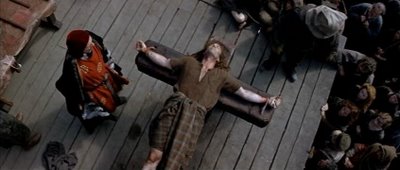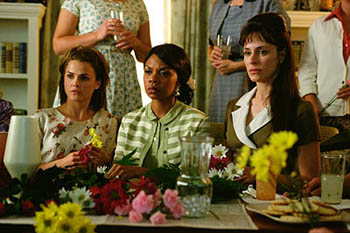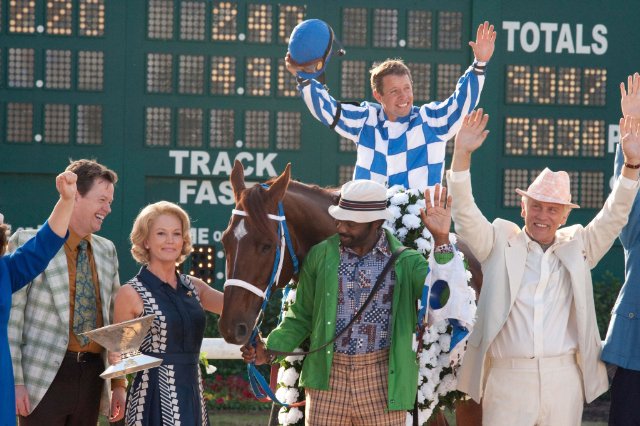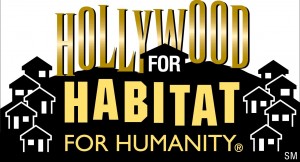In frenzy excitement he eats up the ground, he paws fiercely, rejoicing in his strength and charges into the fray… afraid of nothing, when the trumpet sounds….”
 With these words from the Prophet Job, brought vividly to the screen with stunning images of a racing horse, Director Randall Wallace opens his latest film, “Secretariat.” The extraordinary opening shots bring the viewer from the outset not just into the race ( as many “horse movies” have done) but into the horse itself, to experience the powerful beat of a heart that was created with a capacity to win at record breaking speeds.
With these words from the Prophet Job, brought vividly to the screen with stunning images of a racing horse, Director Randall Wallace opens his latest film, “Secretariat.” The extraordinary opening shots bring the viewer from the outset not just into the race ( as many “horse movies” have done) but into the horse itself, to experience the powerful beat of a heart that was created with a capacity to win at record breaking speeds.
“ What I loved about this story,” says Wallace, “is it came when everything in the world seemed wrong: the war in Vietnam, great men being killed [Martin Luther King, BobbieKennedy] and a lack of trust in our political leaders [Watergate]. Then along came this horse who was incorruptible, a genuine source of inspiration that united people from all spheres of life in one cheer – it was a story of pure joy and celebration.”
There are few successful movie directors in Hollywood who can claim what Wallace can claim: a theology background, with a seminary education (Duke Divinity School) and a writer and music artist whose work in film was from the beginning considered by him a “calling.”
“I studied religion not because I wanted to know if there was life after death,” Wallace says, “butI wanted to discover life after birth. I wanted to be fully alive and my understanding of that began when I began to study theology. The history, the great thinkers and thoughts were fascinating, but faith was something I had to find and live. So movies were for me the greatest expression of a calling. I felt guilty to leave my friends who were going to comfort the dying and visit the sick, feed the hungry. But they told me that what I would do in film would help feed hungry spirits….”
When I met Randall Wallace he was doing what he loves best, sharing his life and his craft with an aspiring generation of young filmmakers. This was the third time that he has taught a masterclass in screenwriting at Sacred Heart University, Milan. What he shared with us told us why: “I love coming to this University….I have found students bright, with luminous spirit; I don’t have to light a flame [to motivate them to make films full of hope and courage], just breathe on their fire within….help it burn a little brighter….with more hope.”
Given such a background, we were curious to know what Wallace would identify as the main inspiration for his work.
 “When I was very young I saw the movie “A Man for all Seasons,” the portrayal of the life of St. Thomas More,” Wallace says. “Itinspired and helped me believe that if I could say ‘amen’ to that same truth I would be doing good work. It proved to me that making movies was a valuable activity. In‘Man for All Seasons,‘ a man holds Life to be more important than his own physical life; you can see a similar theme in my screen play ‘Braveheart.‘ The protagonist believes that the sacrifice of his own physical life is a way to be more alive, that he is not losing his life.”
“When I was very young I saw the movie “A Man for all Seasons,” the portrayal of the life of St. Thomas More,” Wallace says. “Itinspired and helped me believe that if I could say ‘amen’ to that same truth I would be doing good work. It proved to me that making movies was a valuable activity. In‘Man for All Seasons,‘ a man holds Life to be more important than his own physical life; you can see a similar theme in my screen play ‘Braveheart.‘ The protagonist believes that the sacrifice of his own physical life is a way to be more alive, that he is not losing his life.”
Thereis a consistent theme, a forgiveness that runs through many of Wallace’s screen plays and novels; we asked what this meant to him on a personal level:
“I think we must first forgive ourselves before forgiving anyone else, accepting the frailness of our own humanity. We have to accept the fact that we ourselves are broken people in order to truly accept the flaws of others. This, I think, is the basis of forgiveness and it’s the great challenge of my life. I believe in discipline, the ‘warrior ethic’ and therefore the characters I write about are all facing the same dragons I face in my own life. I believe that the great cinematic moments are when the audience can stand in the same place as the main character. When they can believe that the truth of what the protagonist is battling and the outcome is in doubt, they can see the unfolding of a miracle happening when someone forgives, when someone trusts – it defines one’s truest nature.
Wallace has a reputation of going against theculture of Hollywood. “How have you “held fast,” we wanted to know, “in an environment which seems to be so countercultural to your ideals, to a faith-valued person like yourself?”
 “There is an old spiritual hymn that says “you have to walk that lonesome valley…you’ve got to walk it by yourself” and this is what I find,” Wallace replies. “EverydayI can hope to have someone else do it for me, but everyday I have to get up and find faith and hope. What happens, I think, is that when you are prepared to stand alone, that’s when you find that others are there. There is no easy way out. My parents taught me when I was little that the easy way is the way that loses, the hard way, is the way that climbs. I think so often we look for our heroes to be perfect, but I have felt long ago that I cannot be perfect. So it gets back to your question of forgiveness – everyday I have to accept my own limitations and trust that if I am open to faith than I can keep going.”
“There is an old spiritual hymn that says “you have to walk that lonesome valley…you’ve got to walk it by yourself” and this is what I find,” Wallace replies. “EverydayI can hope to have someone else do it for me, but everyday I have to get up and find faith and hope. What happens, I think, is that when you are prepared to stand alone, that’s when you find that others are there. There is no easy way out. My parents taught me when I was little that the easy way is the way that loses, the hard way, is the way that climbs. I think so often we look for our heroes to be perfect, but I have felt long ago that I cannot be perfect. So it gets back to your question of forgiveness – everyday I have to accept my own limitations and trust that if I am open to faith than I can keep going.”
In 1999 Randall started his own production company which he says isbased on the values of honor, courage, love and compassion. This may appear to be unusual in an industry that often values economic gain over communicating a meaningful message We ask what led him to go so drastically against the modern trends and take such a personal and economic risk.
“I believe that those values, are, in fact, the values of the audience,” Wallace says, “thatthe longing of the human heart is for a belief in love, courage, truth. Perhaps one of Hollywood’s greatest mistakes is at times to have a certain contempt for the audience. When I wrote my screenplays I was surprised to find that the same things that my characters wanted from life was what the hearts of others were longing for in cultures all around the world. Everyone wanted to believe that in some sacred place in their life they could cry out for freedom and not give in. It’s a universal theme. The risk in doing films like this is lonely, but not dangerous. I think it’s smart to do what others are not doing, to give the audience what the audience really does want. Logically I am not the only one who believes this in Hollywood. There are many filmmakers who trust in those values.”
 Wallace is at home writing for and directing some of Hollywood’s most famous. In fact his latest film “Secretariat” stars Diane Lane and John Malkovich. No matter who’s going to be in front of the camera, he works hard with the total crew to create a family on the set. We asked him how he does this.
Wallace is at home writing for and directing some of Hollywood’s most famous. In fact his latest film “Secretariat” stars Diane Lane and John Malkovich. No matter who’s going to be in front of the camera, he works hard with the total crew to create a family on the set. We asked him how he does this.
“It’s a double edge sword, very difficult to do. When I was filming “Secretariat” I gathered everyone together on the first day of shooting. We made a circle, locking arms, and I told them that the movie would never be all that I wanted it to be unless it was all that they wanted it to be. The director’s job is to inspire the audience but first you must inspire the crew and the cast; to do that you must be inspired yourself. We had a small budget for this film. I lived in the small local motel with my crew and did my laundry at the same laundry-mat. It’s good for the crew to know that their director is one of them. Creating a real team approach to filmmaking is both an opportunity and a responsibility.”
After Wallace’s first screenplay for “Braveheart” won five Oscars, celebrity mania prevailed and his life was besieged by people wanting to use any connection they could find with him to gain leverage for a job in the film industry. Describing this difficult time, Wallacesays, “that itleft me extremely isolated and lonely. I realized for the first time in my life that success could be more dangerous than failure; to gain fame and money and lose my soul would be death. I was looking for something that would feed my spirit.”
 In 2000, Wallace founded Hollywood Habitat for Humanity, a partnership with Habitat for Humanity that involves actors, screenwriters, musicians, directors, studio executives among the many volunteers who help to build homes for people in need in the US and abroad.
In 2000, Wallace founded Hollywood Habitat for Humanity, a partnership with Habitat for Humanity that involves actors, screenwriters, musicians, directors, studio executives among the many volunteers who help to build homes for people in need in the US and abroad.
“Building houses together with the people who are going to live in that house was completely fulfilling for me. It was a project that would purify hearts and I needed this more than anyone. What I say about Habitat for Humanity is that you’ll get your hands dirty, but your hearts cleansed.”
So whetherWallace is building a house, creating a screenplay, writing a novel, or directing a film his versatile life is always in motion, a journey, eased on by a creative spirit rooted in his faith, “of which,” in his own words, “many people are participating and the work that unfolds, which is a miracle of creation, is greater than oneself.”
His parting words to the 150 young people facing him might be just the reason why this is so: “just keep doing what you love,” he says with moist eyes, “and your heart will grow.”
______________________
Mary Cass is a guest contributer for Reel Spirituality. We are honored to publish her interview with Randall Wallace. This article will be published in the future in Living City Magazine, a publication of the Focolare Movement.
Mary V. Cass is co-director of the Section of Cinema/TV for NetOne, the International Communications Center of the Focolare Movement, headquartered in Rome, Italy.
Ms. Cass is a graduate of Simmons College, Boston, Ma. in Social Sciences, with graduate studies accomplished in Florence, Italy. She has held numerable positions of responsibility in the field of Social Services, among which working with abused and neglected children for the Illinois Department of Children and Family Services, involving developing resources and training programs for caretakers, social workers, and professionals. She was also Director of Social Services for St. John of God Residential Center, Los Angeles, Ca.
With NetOne, Ms Cass, among other activities, organizes encounters for the film community of Rome – evenings of dialogue with well known directors, screenwriters, or producers in the field with European filmmakers.
The Focolare Movement, WORK OF MARY, is an ecclesial movement born in the heart of the Catholic Church. The movement is made up of persons of all ages, races, vocations, and now it is spread in over 100 nations. It is articulated in various branches and structures.
